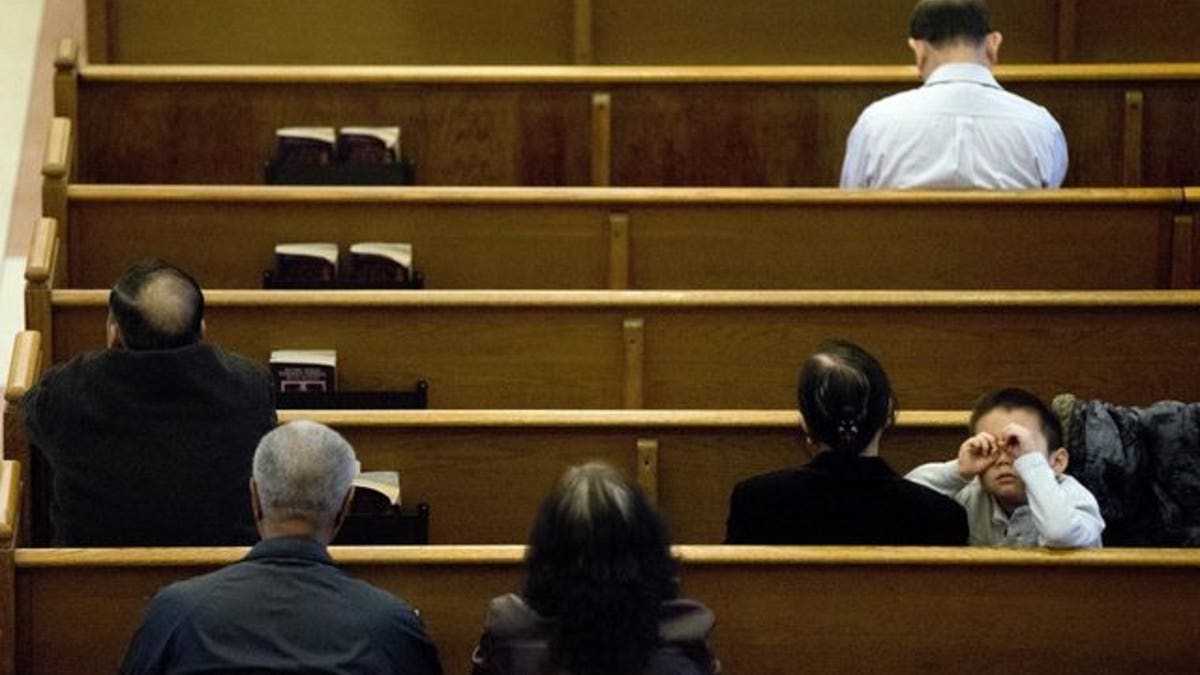
A Good Friday service in Philadelphia. (AP Photo/Matt Rourk)
The proportion of Americans "absolutely certain" God exists dropped by 8 percent in less than a decade, just one of the findings in a wide-ranging survey released Tuesday on faith in the U.S.
63 percent said they were sure of God's existence, compared to 71 percent in 2007, according to the Pew Research Center's Religious Landscape Study.
It showed that Americans overall were less religious. 83% described themselves as "religiously affiliated" in 2007, a number that dropped to 77% in 2014.
Still, the survey brought some good news for religious leaders. U.S. adults who continue to identify with a faith group have largely stayed as religiously engaged as they were seven years ago, evidence of a solid core of committed faithful who remain a bulwark against secularization.
Two-thirds of religiously affiliated adults said last year that faith was very important to them and they prayed daily, nearly unchanged from 2007. About 6-in-10 said they attend worship services at least once or twice a month, a rate similar to years before.
By other measures, the religiously affiliated are more devoted than they were years before. A higher percentage say they regularly read scriptures, participate in small prayer or study groups and share their faith with others. Forty-six percent said they believe their faith tradition should "preserve traditional beliefs and practices" in the face of changes in modern society, up slightly from seven years ago.
Pew released the findings, based in part on a 2014 telephone survey of more than 35,000 people, as religious leaders are grappling with the shifting makeup of American religious life, including the end of what was once a Protestant majority and shrinking membership in denominations ranging from liberal mainline churches to the conservative Southern Baptist Convention.
In an initial release of data last May, Pew researchers found that Americans who don't affiliate with a religion have become the second-largest group in total numbers behind evangelicals, comprising nearly 23 percent of U.S. adults. Within that group, dubbed "nones," a growing share described themselves as atheist or agnostic, making the country less religious overall.
At the same time, the report found growing strength among evangelicals. The overall number of evangelicals rose to 62 million people, or a quarter of the population, and evangelicals were the only major Christian group between 2007 and 2014 to gain more members than they lost, Pew researchers said.
Across major faith traditions, the level of commitment varies. Still, Pew found broad evidence of a stable or slightly increased commitment to faith among those who identified with a particular religion, including among Roman Catholics, liberal Protestants and Jews.
Regarding politics, the study found a widening religion split between the major political parties. People with no religious ties are now the largest group of Democratic Party members and those who lean Democratic, comprising 28 percent of the coalition, compared to 19 percent in 2007. The trend raises challenges for Democrats. Sixty-two percent of "nones" said they were "absolutely certain" they were registered to vote, compared to 71 percent of people who identified with a religion. Evangelicals remain the largest religious group in the GOP and for those who lean Republican, making up 38 percent of GOP supporters.
The survey also found nearly every major religion was notably more accepting of same-sex relationships, including among groups that have been most vocally opposed to gay marriage. The change is driven strongly by younger generations. For example, half of millennials who say they are evangelical say homosexuality should be accepted by society, the survey found.
Pew's telephone survey, conducted June 4 through Sept. 30 of 2014, has an overall margin of error of plus or minus less than 1 percentage point, although the margin of error is higher for findings on individual religious traditions.
The Associated Press contributed to this report.









































